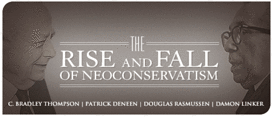Lead Essay
Neoconservative intellectuals often describe themselves as having a particular mode of thinking — maybe even just a “mood.” C. Bradley Thompson argues that neoconservatism is much more than that. Its key philosophical inspiration of comes from Irving Kristol, and particularly from Kristol’s engagement with the philosopher Leo Strauss. Thompson argues that, under Straussian influence, neoconservatives champion the rule of a philosophically cunning elite over a population that will never be able to understand their intellectual masters. Instead, the populace is steered toward self-sacrifice, war, and nationalism — as well as a set of religious and moral beliefs that the elites in no way share. Such a doctrine, Thompson charges, points disturbingly toward fascism.
Response Essays
Douglas Rasmussen argues that post-Lockean natural rights theory does not entail nihilism, as Strauss seems to have feared. A further error of Straussian neoconservatism, Rasmussen argues, is that it often conflates society with the state. Although the members of a civil society may rightly desire that society’s continuance, it does not follow that the state must coerce people into being good. Statecraft is not soulcraft; governing consists of setting ground rules that leave individuals free to seek the good.
Patrick Deneen disagrees that neoconservatism is alien to the American political tradition. In particular, founders such as James Madison and Alexander Hamilton envisioned politics as a realm where men of extraordinary wisdom and talent would shape the course of the new nation. The idea that commerce may corrode the morals is certainly present at the founding, as are civic virtue, self-sacrifice, and concern for the public good, the latter to be divined by wise statesmen. The neoconservative claim to Americanism is as strong, if not stronger, than Thompson’s preferred libertarian ideology.
Damon Linker argues that, although Thompson’s treatment of neoconservatism has considerable value, he errs in his characterization of Leo Strauss and his followers’ political theory. Strauss was an Aristotelian, Linker argues, and Aristotelian political thought is comparatively benign. Linker also argues that national greatness conservatism—a staple of today’s neoconservatives—is a 1990s addendum to the philosophy with little relation to Strauss, Irving Kristol, or the other early lights of neoconservatism.
The Conversation
Related at Cato
- Book Forum: Neoconservatism: An Obituary for an Idea

